Visit by Mr. Keitaro Sato, Ambassador in Charge of Conflict and Refugee-related Issues in Africa to the Federal Democratic Republic of Ethiopia, Republic of Mali and the Republic of Côte d'Ivoire
(Summary and Evaluation)
June 2004
1. Summary
From May 23 to June 4, 2004, Mr. Keitaro Sato, Ambassador in Charge of Conflict and Refugee-related Issues in Africa, visited the Federal Democratic Republic of Ethiopia, Republic of Mali and the Republic of Côte d'Ivoire. In Ethiopia Ambassador Sato attended the Inauguration Ceremony of the Peace and Security Council of the African Union (AU) as the representative of the Government of Japan. In Mali, Ambassador Sato attended the Sixth Ministerial Meeting of the Human Security Network as an observer. In Côte d'Ivoire, Ambassador Sato engaged in a wide range of opinion exchanges, with Ivorian government officials and officials of international organizations on the issues of Japan's contribution for the consolidation of peace and the peace process.
2. Inauguration Ceremony of the Peace and Security Council of the AU (Ethiopia)
The Inauguration Ceremony of the Peace and Security Council of the AU took place at the AU Headquarters in Addis Ababa (Ethiopia) on May 25, 2004. The ceremony was attended by Presidents and Prime Ministers of various AU member countries including the Democratic People's Republic of Algeria, Federal Republic of Nigeria, Republic of Sudan, Republic of Mozambique, Ethiopia, Kingdom of Lesotho and the Republic of Togo, and by AU member and partner countries. Ambassador Sato attended the ceremony as the official representative of the Government of Japan. The AU's Peace and Security Council will be a central framework for cooperative efforts among African countries towards conflict prevention and conflict resolution in Africa. Ambassador Sato conveyed a congratulatory message from Prime Minister Junichiro Koizumi on the occasion of the Inauguration Ceremony.
3. Sixth Ministerial Meeting of the Human Security Network
The Human Security Network (hereinafter referred to as the "Network") is a group established in 1999 by the initiative of Canada and the Kingdom of Norway, to promote a concept of human security that is somewhat different from the concept of human security being promoted by Japan in the international community. The Network comprises of 12 member countries (note), and the Sixth Ministerial Meeting of the Human Security Network was held from May 27 to 28, with Mali presiding as chair of the meeting (the chair of the Network was passed to Canada at the end of the meeting). On the occasion of the Fifth Ministerial Meeting of the Human Security Network, Mrs. Sadako Ogata, former United Nations High Commissioner for Refugees (currently President of the Japan International Cooperation Agency (JICA)) participated as a guest speaker in her capacity as a co-chair of the Commission on Human Security. Ambassador Sato attended the Sixth Ministerial Meeting of the Human Security Network as the first official observer from Japan, and directly conveyed Japan's concept on human security to the members of the Network through his statement.
(Note): Canada, Austria, Republic of Chile, Hellenic Republic, Republic of Ireland, Hashemite Kingdom of Jordan, Mali, Kingdom of the Netherlands, Norway, Republic of Slovenia, Swiss Confederation and the Kingdom of Thailand. The Republic of South Africa has an observer status.
4. Côte d'Ivoire
(1) Meetings
(a) Prime Minister Seydou Diarra
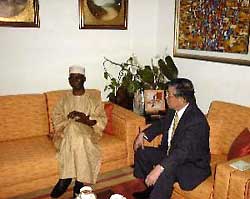
Topics of discussion included the challenges facing the Government of National Reconciliation of Côte d'Ivoire and the Japan's assistance policy. Prime Minister Diarra expressed his appreciation for Japan's support for national reconciliation in Côte d'Ivoire, assistance provided through UN PKO, and assistance for emergency humanitarian relief and DDR activities (disarmament, demobilization and reintegration of former combatants), noting also Côte d'Ivoire's own resolve to make its own efforts in this regard. Prime Minister Diarra largely agreed with the concept of the "consolidation of peace," one of Japan's pillars for assistance to Africa, stating his resolve towards the presidential election scheduled for 2005, and requesting further cooperation from Japan.
(b) Minister of Foreign Affairs Mamadou Bamba
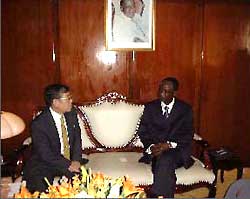
Ambassador Sato introduced Japan's assistance policy to Africa as had been demonstrated on the occasion of the Third Tokyo International Conference on African Development (TICAD III), explaining assistance to Côte d'Ivoire from the perspective of consolidation of peace, which was one of the central messages of TICAD III. In response, Foreign Minister Bamba expressed his appreciation for Japan's assistance, explained the challenges faced in providing assistance to refugees in the West African region, and requested further cooperation from Japan.
(c) Special Envoy of the Secretary-General of the United Nations Albert Tevoedjre
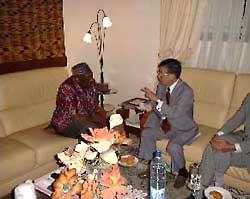
Special Envoy Tevoedjre explained the activities of the UN peacekeeping operations known as United Nations Operation in Côte d'Ivoire (UNOCI), which started operations in April 2004, and outlined future agendas. In response, Ambassador Sato highly evaluated the contribution of UNOCI for peace in Côte d'Ivoire and, in conjunction with this, explained the Japan's contributions to the UN PKOs, to which Special Envoy Tevoedjre expressed his gratitude. Other issues of discussion included the situation in Côte d'Ivoire and UN PKOs in the West African region (Côte d'Ivoire, Republic of Liberia and Republic of Sierra Leone).
(d) Other meetings
Ambassador Sato also engaged in exchanges of opinions in meetings with the representative of the UN High Commissioner for Refugees (UNHCR) in Côte d'Ivoire and the French Ambassador to Côte d'Ivoire. He received explanations concerning refugee issues and the outlook and issues over the presidential election scheduled for 2005, and engaged in discussions on the possibilities for future cooperation.
(2) Site visits and others
Ambassador Sato made site visits to DDR projects, and engaged in opinions exchanges with the local representative of the United Nations Development Programme (UNDP) and persons involved locally in DDR. (Japan is assisting the DDR activities.)
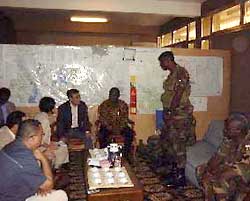
Receiving explanations from persons involved in DDR
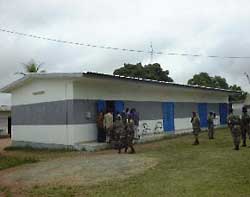
Site visit to DDR activities
(visit to temporary shelter and health center for former combatants)
5. Evaluation
(1) The attendance of Ambassador Sato at the Inauguration Ceremony of the Peace and Security Council of the AU impressed upon all participants, Japan's resolve to focus on consolidation of peace in Africa and to continue active cooperation, as a part of the TICAD process.
(2) The concept of human security being promoted by the Network and that being promoted by Japan, are almost same in content, both based on the concept that through advancing globalization, each individual must be protected from emerging new threats that are difficult to mitigate through existing national security frameworks. On the other hand, the concept being promoted by the Network also includes the principle of "humanitarian intervention," in such a specific case where people in a specific region are facing a significant threat such as conflict or genocide, and sovereign states and governments tasked with the protection of such people are not functioning, the use of military intervention by a third country might be pursued, as a means of last resort and from humanitarian objectives. This concept is opposed by a number of countries, mainly in the Latin America. The concept of human security being promoted by Japan places emphasis on empowerment of people, and has contributed to the UN for the establishment of a Human Security Trust Fund to realize this objective (the fund currently stands at approximately 25.9 billion yen), and is engaged to realize various specific projects through related international organizations.
At the Sixth Ministerial Meeting of the Human Security Network, Ambassador Sato pointed out (a) the points of similarity and difference between the Network's and Japan's concepts, and (b) issues to be faced if Japan and the Network were to create a cooperative relationship in the future. These comments were taken on board by the members of the Network.
Full text of Statement by Ambassador Sato on the Occasion of the Sixth Ministerial Meeting of the Human Security Network
President Amadou Toumani Toure and Minister of Foreign Affairs Moctar Ouane of Mali both highly appreciated Ambassador Sato's attendance at the meeting as well as Japan's range of contributions to Africa as a whole including Mali, and conveyed these gratitude directly to Ambassador Sato.
(3) By calling on high-level members of the Government of National Reconciliation of Côte d'Ivoire to move towards the consolidation of peace, in addition to fulfilling a political role from a Japanese perspective, Ambassador Sato was also able to explain Japan's active assistance policy in the area of consolidation of peace in Côte d'Ivoire. In addition, in order to play a useful role in policy debate in Côte d'Ivoire down the road, Ambassador Sato paid on-site visits to DDR locations, where he discussed various issues with UN officials.
(4) It is almost a year since Ambassador Sato's appointment as Ambassador in Charge of Conflict and Refugee-related issues in Africa, and over the course of the year he has held meetings with many officials and others, and they have highly evaluated the active efforts of Ambassador Sato as an indicator of Japan's strong resolve to implement assistance for consolidation of peace.
(Note):
Visits of Ambassador Sato
(i) July 2003: Mozambique, Republic of Kenya, Sudan
(ii) August 2003: United Republic of Tanzania, Sudan, Ethiopia
(iii) October-November 2003: Republic of Uganda, State of Eritrea, Kenya, Nigeria, Republic of Senegal
(iv) February-March 2004: Republic of Rwanda, Republic of Burundi, Democratic Republic of Congo, Ethiopia, Switzerland, Kingdom of Belgium, French Republic
(v) April 18 to 30, 2004: New York, Liberia
Back to Index
